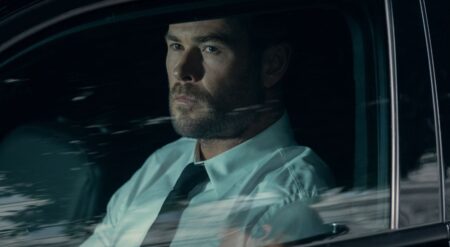Jesse Eisenberg’s feature directorial debut, When You Finish Saving the World, used uncomfortable comedy to explore tensions in a family. With A Real Pain, he does it again, and he does so by putting a deeply personal experience on screen. Written and directed by Eisenberg, A Real Pain stars the writer-director and Keiran Culkin as cousins David and Benji. An odd couple of polar opposites, the duo have reunited after a long time apart to tour through Poland. The trip is one centered on honoring (and grieving) their grandmother, who recently passed away. But as the tour takes deeper into exploring their family and cultural history, their personalities clash.
Eisenberg uses comedy to handle uncomfortable stories deftly. At the same time, the comedy can function as a tension release or something that makes the situation all the more uncomfortable for those involved. The tour group through Poland is made up of people from different identities and reasons to be walking through the horrors of the Holocaust. But as good as they are, the ensemble is more of a backdrop. More voices contextualize Eisenberg’s main point, which is that resiliency through pain, and pain itself, is not the same in every person, and instead of expecting the same response, you should accept the difference.
A Real Pain hurts. It cuts deep because while the film is about generational trauma, it’s about how two people in one family respond to it. The stark turning point in the film’s empathetic journey is when the tour group is at dinner in a Jewish restaurant. Everyone is going around the table sharing stories of their family’s resilience, and Benji, being his brash self, kills the mood again. The camera then moves to David at the head of the table, and he lets everything out.
As the camera pans closer to his face, David is sharing his anger. But as he continues to talk, you can’t tell who the object of his anger really is. Is it Benji or himself? Benji is the family’s disappointment. Their grandmother survived the concentration camps of the Holocaust and fled to New York. She survived. Benji is a third-generation American living on his mom’s couch and getting high. David asks the table, how did he come from a woman who survived by a thousand miracles when the whole world was trying to kill her?
A Real Pain gets at the heart of vulnerability.

It’s a moment that is mean and cruel at times. But it’s not void of empathy or love. He cares for Benji deeply; he loves Benji deeply but also can’t understand how Benji is falling apart. The conversation isn’t just about Benji. It’s also about how David relates his pain in conversation to what his family experienced in the past. For David, his pain is unremarkable, and so he just carries it.
During the Q&A, Eisenberg explained that the story is meant to cross cultures. It’s supposed to speak to anyone who lives with generational trauma and ultimately how it informs how they relate to their family. Eisenberg accomplishes this perfectly. I am not Jewish, but I am an oversucceeding child in a family that carries deep scars. And I have a brother who is just there struggling with half of the weight I have had to carry. Watching David at the table lay into his cousin, I started crying because I saw myself. The resentment and how it seeps into the empathy you try to have.
While I saw myself in David, Kieran Culkin‘s Benji is endearing. Infuriating at times and always loud, he wears his feelings and thoughts on his sleeves with no concern for filtering who he is for those around him. But beneath the joy and jokes, Culkin plays Benji with deep pain. One that is rooted in his heart and sprouts continuously throughout the film.
A Real Pain isn’t about whose pain is working but about bridging the gap between David and Benji. Resiliency doesn’t manifest in one way. Both cousins are making it through life the only way they know how, and the empathy between them is how they get through it together. The film isn’t about anything spectacular in what it shows. It’s a stripped-down slice-of-life film that is about people. It’s deeply about people and the layers of pain that cake onto their lives over time. It’s a generational story without harping on the past, but instead, looking to the present, see how the ripples have carried through the lives of the newer generations.
An unassuming film, A Real Pain will stay with those who carry their family’s trauma buried underneath their own weeping. Not because you’re sad but because it’s a mirror at times. Jesse Eisenberg has created a personal story that resonates. Not all pain is equal, but it doesn’t stop any of it from being there.
A Real Pain was screened as a part of Sundance 2024 and is available now on Hulu.
A Real Pain won the Academy Award for Best Actor in a Supporting Role (Kieran Culkin).
A Real Pain
-
Rating - 9/109/10
TL;DR
An unassuming film, A Real Pain will stay with those who carry their family’s trauma buried underneath their own weeping. Not because you’re sad but because it’s a mirror at times. Jesse Eisenberg has created a personal story that resonates.







